UST
-
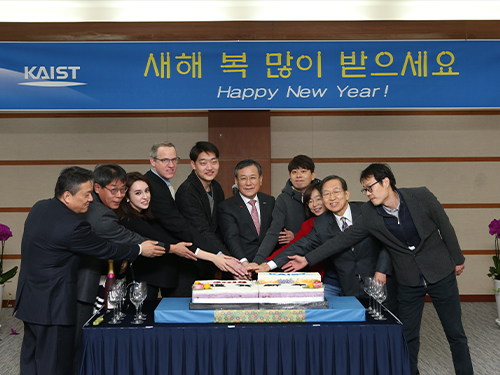 President Shin Reaffirms Innovation Initiatives in New Year Speech
(President Shin and representatives of faculty, students, staff celebrate the New Year in a reception held on January 2 at the auditorium.)
The KAIST community gathered to celebrate a fresh start for the year 2018. At the ceremony, held in the auditorium on January 2, members of KAIST community reaffirmed their commitment to be the trailblazers of Korea and beyond through unwavering innovations.
President Sung-Chul Shin presented his new vision and plan in his New Year speech, which focused on innovation for enhancing institutional competitiveness and global visibility. He said that as you are the future of KAIST, KAIST is the future of Korea. KAIST’s vision for a better future will have a significant impact on national progress and beyond. He stressed that innovation in the five pillars of education, research, technology commercialization, globalization, and future strategy will further advance the excellence of KAIST.
At the ceremony, President Shin also presented the award for ‘the KAISTian of the Year’ to Professor YongKeun Park of the Department of Physics. The annual award recognizes a distinguished professor whose academic accomplishments made the most significant impact.
In his New Year speech, President Shin said that the year 2018 will provide an opportunity to take a leap forward for becoming a ‘Global Value Creative, World-Leading University. The Vision 2031 Committee endorsed the five innovation initiatives to fulfill KAIST’s long-term vision and will open its recommendations to the public on March 20.
Educational innovation tops the initiatives. President Shin explained that the future of Korea is in the hands of talented individuals in science and technology, emphasizing the need to nurture creative, transdisciplinary talents with the capacity to enhance the social value of science and technology.
To this end, KAIST will establish a new undergraduate non-departmental program for transdisciplinary education. This plan will eventually provide students with more options in choosing their major, as well as help students build a strong foundation in basic science and engineering and encourage multidisciplinary approaches.
For creating an innovative institutional research infrastructure, KAIST plans to build a Network of Excellence for the Fourth Industrial Revolution (NExFire) for convergence research. The plan of ‘Cross-Generational Collaborative Labs,’ will bring out a new collaboration platform by pairing up senior and junior faculty. President Shin said it will be a stepping stone to extend the spectrum of knowledge without any cessation.
For technology commercialization, KAIST will maximize its intellectual property and economic value by stimulating technology-invested companies and startups. Close cooperation with venture capitalists at home and abroad will further accelerate the commercialization drive at KAIST.
Saying that the globalization is no long an option but a necessity, he stressed KAIST will strengthen its efforts to established a bilingual campus. “KAIST will make every effort to create a more welcoming and comfortable atmosphere for the international community and their families. We will expand benefits to our international community, such as access to the KAIST Child Care Center and collaboration with the Taejon Christian International School (TCIS),” he said. President Shin added he will further expand global networks and partnerships this year, participating in a diverse range of international events at home and abroad for increasing global visibility.
He also said that well-designed future strategies will complete innovation initiatives. The Future Strategy Research Center will serve as a think tank for identifying future agendas, establishing strategies and advocating for them.
In addition to the five innovation initiatives, President Shin emphasized a new organizational culture that embraces inclusiveness and mutual respect among all of the members of KAIST.
“So far, the ideal qualifications expected of KAISTians have included creativity and a challenging spirit. From now on, we will nurture talents with a focus on the 3Cs: Creativity, Challenge, and Caring. I would like to make a campus in which all members care for each other to help attain mutual growth with warmth and respect," he said.
For the full text, Click
2018.01.02 View 6091
President Shin Reaffirms Innovation Initiatives in New Year Speech
(President Shin and representatives of faculty, students, staff celebrate the New Year in a reception held on January 2 at the auditorium.)
The KAIST community gathered to celebrate a fresh start for the year 2018. At the ceremony, held in the auditorium on January 2, members of KAIST community reaffirmed their commitment to be the trailblazers of Korea and beyond through unwavering innovations.
President Sung-Chul Shin presented his new vision and plan in his New Year speech, which focused on innovation for enhancing institutional competitiveness and global visibility. He said that as you are the future of KAIST, KAIST is the future of Korea. KAIST’s vision for a better future will have a significant impact on national progress and beyond. He stressed that innovation in the five pillars of education, research, technology commercialization, globalization, and future strategy will further advance the excellence of KAIST.
At the ceremony, President Shin also presented the award for ‘the KAISTian of the Year’ to Professor YongKeun Park of the Department of Physics. The annual award recognizes a distinguished professor whose academic accomplishments made the most significant impact.
In his New Year speech, President Shin said that the year 2018 will provide an opportunity to take a leap forward for becoming a ‘Global Value Creative, World-Leading University. The Vision 2031 Committee endorsed the five innovation initiatives to fulfill KAIST’s long-term vision and will open its recommendations to the public on March 20.
Educational innovation tops the initiatives. President Shin explained that the future of Korea is in the hands of talented individuals in science and technology, emphasizing the need to nurture creative, transdisciplinary talents with the capacity to enhance the social value of science and technology.
To this end, KAIST will establish a new undergraduate non-departmental program for transdisciplinary education. This plan will eventually provide students with more options in choosing their major, as well as help students build a strong foundation in basic science and engineering and encourage multidisciplinary approaches.
For creating an innovative institutional research infrastructure, KAIST plans to build a Network of Excellence for the Fourth Industrial Revolution (NExFire) for convergence research. The plan of ‘Cross-Generational Collaborative Labs,’ will bring out a new collaboration platform by pairing up senior and junior faculty. President Shin said it will be a stepping stone to extend the spectrum of knowledge without any cessation.
For technology commercialization, KAIST will maximize its intellectual property and economic value by stimulating technology-invested companies and startups. Close cooperation with venture capitalists at home and abroad will further accelerate the commercialization drive at KAIST.
Saying that the globalization is no long an option but a necessity, he stressed KAIST will strengthen its efforts to established a bilingual campus. “KAIST will make every effort to create a more welcoming and comfortable atmosphere for the international community and their families. We will expand benefits to our international community, such as access to the KAIST Child Care Center and collaboration with the Taejon Christian International School (TCIS),” he said. President Shin added he will further expand global networks and partnerships this year, participating in a diverse range of international events at home and abroad for increasing global visibility.
He also said that well-designed future strategies will complete innovation initiatives. The Future Strategy Research Center will serve as a think tank for identifying future agendas, establishing strategies and advocating for them.
In addition to the five innovation initiatives, President Shin emphasized a new organizational culture that embraces inclusiveness and mutual respect among all of the members of KAIST.
“So far, the ideal qualifications expected of KAISTians have included creativity and a challenging spirit. From now on, we will nurture talents with a focus on the 3Cs: Creativity, Challenge, and Caring. I would like to make a campus in which all members care for each other to help attain mutual growth with warmth and respect," he said.
For the full text, Click
2018.01.02 View 6091 -
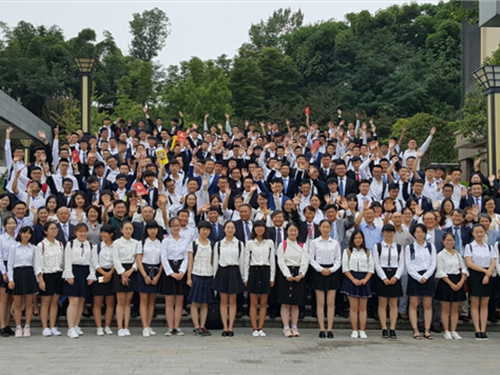 CLKIP Bearing Fruit in China
The Chongqing Liangjiang KAIST International Program (CLKIP) is rapidly gaining steam in China. CLKIP, an educational program operated in Chongqing internationally by KAIST since 2015, offers two majors, Electronic Information Engineering and Computer Science and Technology, applying the same curriculum as at KAIST.
To operate the program, KAIST assigns professors from the School of Electrical Engineering and the School of Computing to the program every year. They are in charge of one-third of the major courses, and transfer KAIST’s educational curriculum and know-how.
A total of 13 professors from Chongqing University of Technology (CQUT) have received or are receiving training on advanced education methodologies and technical know-how, including an on and offline integrated learning program, called Education 4.0 and large-scale internet open learning.As CLKIP is gaining in popularity, the number of students for its undergraduate courses keeps increasing, from 66 in 2015 to 172 in 2016 and 200 students in 2017, achieving the student volume for enrollment annually.
CLKIP selected seven exchange undergraduate students and five dual-degree students this fall, and they are currently studying in KAIST for either one semester or one full year.
CLKIP is located in Chongqing, one of the major direct-controlled municipalities and a focal point for notable government projects. The Korea-China industrial zone is also located in this area.
Considering its location, CLKIP is more than just an international programs for educational cooperation. The program will provide opportunities to cooperate with Korean enterprises including Hyundai, SK Hynix, LG Chem and Hankook Tire. While cooperating in research and development as well as technical assistance, KAIST hopes that these enterprises will play a bridging role for KAIST alumni entering the Chinese market.
President Sung-Chul Shin said, “The success of CLKIP shows that KAIST programs for fostering future manpower and developing cutting-edge technologies do work in other countries. Based on this case, KAST will put more effort into transferring our innovative education systems abroad. We are also pushing ahead to establish a joint institute between KAIST and CQUT by 2018, which will become a foundation for facilitating the entry of KAIST’s cutting-edge technologies into the Chinese market.”
“KAIST aims to become an entrepreneurial university that creates value through technology commercialization. In this sense, KAIST plans to transfer advanced technologies to domestic and international companies located in the Liangjiang district,” he added.
2017.12.12 View 7338
CLKIP Bearing Fruit in China
The Chongqing Liangjiang KAIST International Program (CLKIP) is rapidly gaining steam in China. CLKIP, an educational program operated in Chongqing internationally by KAIST since 2015, offers two majors, Electronic Information Engineering and Computer Science and Technology, applying the same curriculum as at KAIST.
To operate the program, KAIST assigns professors from the School of Electrical Engineering and the School of Computing to the program every year. They are in charge of one-third of the major courses, and transfer KAIST’s educational curriculum and know-how.
A total of 13 professors from Chongqing University of Technology (CQUT) have received or are receiving training on advanced education methodologies and technical know-how, including an on and offline integrated learning program, called Education 4.0 and large-scale internet open learning.As CLKIP is gaining in popularity, the number of students for its undergraduate courses keeps increasing, from 66 in 2015 to 172 in 2016 and 200 students in 2017, achieving the student volume for enrollment annually.
CLKIP selected seven exchange undergraduate students and five dual-degree students this fall, and they are currently studying in KAIST for either one semester or one full year.
CLKIP is located in Chongqing, one of the major direct-controlled municipalities and a focal point for notable government projects. The Korea-China industrial zone is also located in this area.
Considering its location, CLKIP is more than just an international programs for educational cooperation. The program will provide opportunities to cooperate with Korean enterprises including Hyundai, SK Hynix, LG Chem and Hankook Tire. While cooperating in research and development as well as technical assistance, KAIST hopes that these enterprises will play a bridging role for KAIST alumni entering the Chinese market.
President Sung-Chul Shin said, “The success of CLKIP shows that KAIST programs for fostering future manpower and developing cutting-edge technologies do work in other countries. Based on this case, KAST will put more effort into transferring our innovative education systems abroad. We are also pushing ahead to establish a joint institute between KAIST and CQUT by 2018, which will become a foundation for facilitating the entry of KAIST’s cutting-edge technologies into the Chinese market.”
“KAIST aims to become an entrepreneurial university that creates value through technology commercialization. In this sense, KAIST plans to transfer advanced technologies to domestic and international companies located in the Liangjiang district,” he added.
2017.12.12 View 7338 -
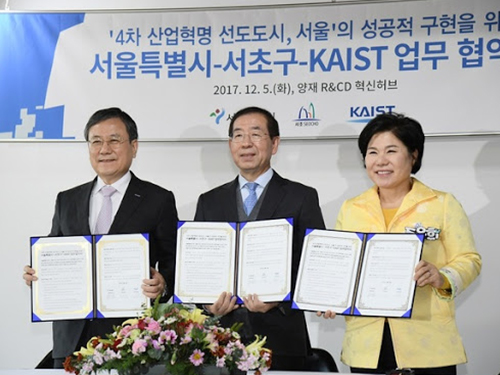 MoU by KAIST-Seoul-Seocho-gu for the 4th Industrial Revolution
The opening ceremony of the Yangjae R&CD Innovation Hub was held in Seoul on December 5. More than 400 guests came to the ceremony from major institutes and companies that are based in the hub. KAIST President Sung-Chul Shin, the Mayor of Seoul, Won-soon Park, and the Mayor of Seocho-gu, Eun Hee Cho, signed an MoU for Seoul to be the leading city for successfully realizing the Fourth Industrial Revolution.
The three organizations aim to cooperate with one another in various areas, including an economic boost for local job creation, technology development, and the promotion of projects through an industry-academia-institute network and fostering manpower.
Yangjae R&CD is the first facility specializing in and dedicated for Artificial Intelligence, which is the major topic of the Fourth Industrial Revolution.
The hub is comprised of enterprises specializing in AI, open co-work spaces, conference rooms, an open networking lounge, and spaces for fostering professional manpower. The hub will recruit additional enterprises and individuals who wish to move in. KAIST, an institute containing professors and researchers in the field of AI, and Modulabs, an organization becoming distinguished in AI research, will be in charge of operating the facility together.
The Yangjae R&CD Innovation Hub will operate a professional training program with participation from KAIST professors, which aims to produce 500 professionals in AI research and development by 2020. It will also provide inexpensive space as well as consultations and venture capital to startup and venture companies. It plans to find and foster 50 innovation companies by 2020.
In particular, the hub will operate a course for new AI business models 24 times over three years.
The hub also offers job consultations, academic conferences, public space for companies residing in the hub, a free GPU cluster server, technical training, seminars, forums, investment attraction, overseas expansion, and one-to-one technical consultations.
The Yangjae R&CD Zone is the place established for the Fourth Industrial Revolution by Seoul. R&CD is a concept combining Research and Development, Connection, Companies, Community, and Culture.
Seoul aims to create the Yangjae Zone as an urban innovation hub for facilitating industry-academia linkage as well as establishing a startup-settlement-growth technical ecosystem.
2017.12.11 View 6344
MoU by KAIST-Seoul-Seocho-gu for the 4th Industrial Revolution
The opening ceremony of the Yangjae R&CD Innovation Hub was held in Seoul on December 5. More than 400 guests came to the ceremony from major institutes and companies that are based in the hub. KAIST President Sung-Chul Shin, the Mayor of Seoul, Won-soon Park, and the Mayor of Seocho-gu, Eun Hee Cho, signed an MoU for Seoul to be the leading city for successfully realizing the Fourth Industrial Revolution.
The three organizations aim to cooperate with one another in various areas, including an economic boost for local job creation, technology development, and the promotion of projects through an industry-academia-institute network and fostering manpower.
Yangjae R&CD is the first facility specializing in and dedicated for Artificial Intelligence, which is the major topic of the Fourth Industrial Revolution.
The hub is comprised of enterprises specializing in AI, open co-work spaces, conference rooms, an open networking lounge, and spaces for fostering professional manpower. The hub will recruit additional enterprises and individuals who wish to move in. KAIST, an institute containing professors and researchers in the field of AI, and Modulabs, an organization becoming distinguished in AI research, will be in charge of operating the facility together.
The Yangjae R&CD Innovation Hub will operate a professional training program with participation from KAIST professors, which aims to produce 500 professionals in AI research and development by 2020. It will also provide inexpensive space as well as consultations and venture capital to startup and venture companies. It plans to find and foster 50 innovation companies by 2020.
In particular, the hub will operate a course for new AI business models 24 times over three years.
The hub also offers job consultations, academic conferences, public space for companies residing in the hub, a free GPU cluster server, technical training, seminars, forums, investment attraction, overseas expansion, and one-to-one technical consultations.
The Yangjae R&CD Zone is the place established for the Fourth Industrial Revolution by Seoul. R&CD is a concept combining Research and Development, Connection, Companies, Community, and Culture.
Seoul aims to create the Yangjae Zone as an urban innovation hub for facilitating industry-academia linkage as well as establishing a startup-settlement-growth technical ecosystem.
2017.12.11 View 6344 -
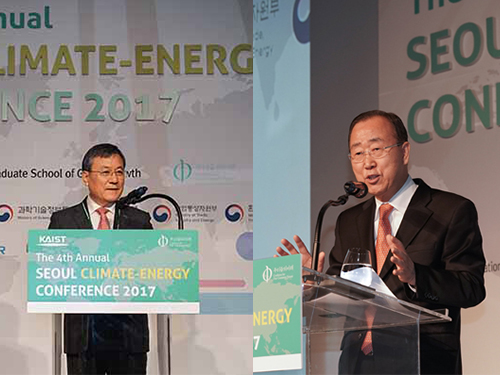 Seoul Climate-Energy Conference Seeks Global Sustainability
(President Shin and Former UN Secretary General at the Seoul Climate Change-Energy Conference)
Global leaders from both the private and public sectors discussed creative ways to seek inclusive green growth and sustainable development at the Seoul Climate-Energy Conference on November 24 in Seoul. The annual conference was co-hosted by KAIST and the Coalition for Our Common Future under the theme “Creating New Momentum for the Paris Agreement and a Sustainable Future.”
More than 100 global leaders participated in the forum including the Director General Frank Rijsbermanof the Global Green Growth Institute and Executive Director Howard Bamsey of the Green Climate Fund. Former UN Secretary-General Ban Ki-Moon, who played a significant role in the signing of the Paris Agreement, was the keynote speaker.
This year’s conference focused on Korea’s low carbon-energy transition and the Fourth Industrial Revolution to be aligned with green growth. At the conference, speakers and participants reviewed the progress of the decisions made by the UN Framework Convention on Climate Change (UNFCCC) COP23 in Bonn, Germany. The conference discussed topics of global collaboration for new climate regimes, green energy infrastructure, the Asia super grid, financing green energy, smart green cities, and new mobility.
President Sung-Chul Shin emphasized global action and greater resilience toward climate change in his opening remarks. He said, “Today’s climate change can be attributed directly to the past three industrial revolutions. As industrialization continues, we must not make future generations pay the cost of this Fourth Industrial Revolution.” He explained that it is increasingly complicated to address climate change and energy issues because even though the use of energy consumption will continue to increase, energy policies are interwoven with global politics.
He stressed three keywords to better address this global problem: innovation, collaboration, and speed. First he emphasized innovation as a priority for future success as it is hard to retain confidence without innovation.
He noted KAIST has made sustainability initiatives in the fields of EEWS (energy, environment, water, sustainability) and green mobility. He also noted the importance of collaboration as industries are moving beyond a single discipline. KAIST is making collaborations in R&D and sustainability sectors, such as Saudi Aramco’s CO2 management center in KAIST. Finally, he explained that the speed of new transformation will be beyond our imagination, and governments should work efficiently to address issues in a fast manner.
Meanwhile, Secretary-General Ban called for global unity in addressing climate change. He strongly emphasized that countries should make agreements not of willingness but of action, and that politicians should realize that this global agenda should be given top priority above domestic politics. He addressed how the world is experiencing the most powerful and destructive effects of climate change which makes active participation in the Paris Agreement increasingly important.
He expressed his concern that the richest and most powerful countries are backing off, emphasizing the role of these countries as both global leaders and top producers of CO2. He also shared his hopes that the OECD will continue to work to fill the absence of the United States, and stressed the importance of acquiring 10 billion USD by 2020 to fund mitigation and adaptation technologies for developing countries’ CO2 emissions.
Click for President Shin's opening remarks
2017.11.29 View 5863
Seoul Climate-Energy Conference Seeks Global Sustainability
(President Shin and Former UN Secretary General at the Seoul Climate Change-Energy Conference)
Global leaders from both the private and public sectors discussed creative ways to seek inclusive green growth and sustainable development at the Seoul Climate-Energy Conference on November 24 in Seoul. The annual conference was co-hosted by KAIST and the Coalition for Our Common Future under the theme “Creating New Momentum for the Paris Agreement and a Sustainable Future.”
More than 100 global leaders participated in the forum including the Director General Frank Rijsbermanof the Global Green Growth Institute and Executive Director Howard Bamsey of the Green Climate Fund. Former UN Secretary-General Ban Ki-Moon, who played a significant role in the signing of the Paris Agreement, was the keynote speaker.
This year’s conference focused on Korea’s low carbon-energy transition and the Fourth Industrial Revolution to be aligned with green growth. At the conference, speakers and participants reviewed the progress of the decisions made by the UN Framework Convention on Climate Change (UNFCCC) COP23 in Bonn, Germany. The conference discussed topics of global collaboration for new climate regimes, green energy infrastructure, the Asia super grid, financing green energy, smart green cities, and new mobility.
President Sung-Chul Shin emphasized global action and greater resilience toward climate change in his opening remarks. He said, “Today’s climate change can be attributed directly to the past three industrial revolutions. As industrialization continues, we must not make future generations pay the cost of this Fourth Industrial Revolution.” He explained that it is increasingly complicated to address climate change and energy issues because even though the use of energy consumption will continue to increase, energy policies are interwoven with global politics.
He stressed three keywords to better address this global problem: innovation, collaboration, and speed. First he emphasized innovation as a priority for future success as it is hard to retain confidence without innovation.
He noted KAIST has made sustainability initiatives in the fields of EEWS (energy, environment, water, sustainability) and green mobility. He also noted the importance of collaboration as industries are moving beyond a single discipline. KAIST is making collaborations in R&D and sustainability sectors, such as Saudi Aramco’s CO2 management center in KAIST. Finally, he explained that the speed of new transformation will be beyond our imagination, and governments should work efficiently to address issues in a fast manner.
Meanwhile, Secretary-General Ban called for global unity in addressing climate change. He strongly emphasized that countries should make agreements not of willingness but of action, and that politicians should realize that this global agenda should be given top priority above domestic politics. He addressed how the world is experiencing the most powerful and destructive effects of climate change which makes active participation in the Paris Agreement increasingly important.
He expressed his concern that the richest and most powerful countries are backing off, emphasizing the role of these countries as both global leaders and top producers of CO2. He also shared his hopes that the OECD will continue to work to fill the absence of the United States, and stressed the importance of acquiring 10 billion USD by 2020 to fund mitigation and adaptation technologies for developing countries’ CO2 emissions.
Click for President Shin's opening remarks
2017.11.29 View 5863 -
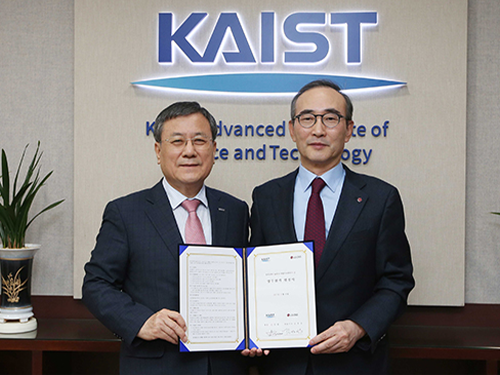 Strengthening Industry-Academia Cooperation with LG CNS
On November 20, KAIST signed an MoU with LG CNS for industry-academia partnership in education, research, and business in the fields of AI and Big Data. Rather than simply developing education programs or supporting industry-academia scholarships, both organizations agreed to carry out a joint research project on AI and Big Data that can be applied to practical business.
KAIST will collaborate with LG CNS in the fields of smart factories, customer analysis, and supply chain management analysis.
Not only will LG CNS offer internships to KAIST students, but it also will support professors and students who propose innovative startup ideas for AI and Big Data. Offering an industry-academia scholarship for graduate students is also being discussed. Together with LG CNS, KAIST will put its efforts into propose projects regarding AI and Big Data in the public sector.
Furthermore, KAIST and LG CNS will jointly explore and carry out industry-academia projects that could be practically used in business. Both will carry out the project vigorously through strong cooperation; for instance, LG CNS employees can be assigned to KAIST, if necessary. Also, LG CNS’s AI and Big Data platform, called DAP (Data Analytics & AI Platform) will be used as a data analysis tool during the project and the joint outcomes will be installed in DAP.
KAIST professors with expertise in AI deep learning have trained LG CNS employees since the Department of Industrial & Systems Engineering established ‘KAIST AI Academy’ in LG CNS last August.
“With KAIST, the best research-centered university in Korea, we will continue to lead in developing the field of AI and Big Data and provide innovative services that create value by connecting them to customer business,” Yong Shub Kim, the CEO of LG CNS, highlighted.
2017.11.22 View 7609
Strengthening Industry-Academia Cooperation with LG CNS
On November 20, KAIST signed an MoU with LG CNS for industry-academia partnership in education, research, and business in the fields of AI and Big Data. Rather than simply developing education programs or supporting industry-academia scholarships, both organizations agreed to carry out a joint research project on AI and Big Data that can be applied to practical business.
KAIST will collaborate with LG CNS in the fields of smart factories, customer analysis, and supply chain management analysis.
Not only will LG CNS offer internships to KAIST students, but it also will support professors and students who propose innovative startup ideas for AI and Big Data. Offering an industry-academia scholarship for graduate students is also being discussed. Together with LG CNS, KAIST will put its efforts into propose projects regarding AI and Big Data in the public sector.
Furthermore, KAIST and LG CNS will jointly explore and carry out industry-academia projects that could be practically used in business. Both will carry out the project vigorously through strong cooperation; for instance, LG CNS employees can be assigned to KAIST, if necessary. Also, LG CNS’s AI and Big Data platform, called DAP (Data Analytics & AI Platform) will be used as a data analysis tool during the project and the joint outcomes will be installed in DAP.
KAIST professors with expertise in AI deep learning have trained LG CNS employees since the Department of Industrial & Systems Engineering established ‘KAIST AI Academy’ in LG CNS last August.
“With KAIST, the best research-centered university in Korea, we will continue to lead in developing the field of AI and Big Data and provide innovative services that create value by connecting them to customer business,” Yong Shub Kim, the CEO of LG CNS, highlighted.
2017.11.22 View 7609 -
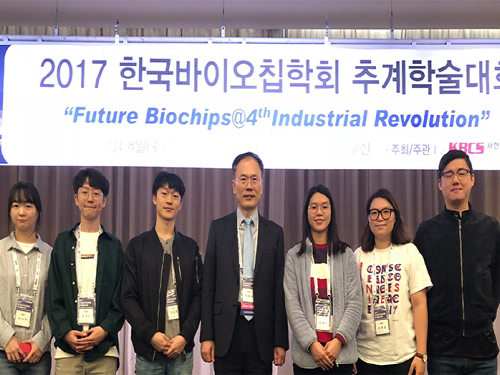 Professor Je-Kyun Park, Awarded by The Korean BioChip Society
On November 9, Je-Kyun Park from the Department of Bio and Brain Engineering at KAIST received an award from the 2017 Fall Meeting of The Korean BioChip Society held in Paradise Hotel Busan, Korea. This year’s meeting recognized Professor Park for developing lab-on-a-chip and microfluidic analytical technologies.
The Korean BioChip Society is a corporation of biochip professional established in 2006 for the development of biochip technology. Every year, the Society selects a recipient based on the nominees’ academic achievements and contributions to bio-fusion industry.
Professor Park served on the international editorial boards of renowned international journals in related fields, including Biosensors and Bioelectronics and Lab on a Chip. He was also the Committee Chairman of MicroTas in 2015.
2017.11.22 View 5491
Professor Je-Kyun Park, Awarded by The Korean BioChip Society
On November 9, Je-Kyun Park from the Department of Bio and Brain Engineering at KAIST received an award from the 2017 Fall Meeting of The Korean BioChip Society held in Paradise Hotel Busan, Korea. This year’s meeting recognized Professor Park for developing lab-on-a-chip and microfluidic analytical technologies.
The Korean BioChip Society is a corporation of biochip professional established in 2006 for the development of biochip technology. Every year, the Society selects a recipient based on the nominees’ academic achievements and contributions to bio-fusion industry.
Professor Park served on the international editorial boards of renowned international journals in related fields, including Biosensors and Bioelectronics and Lab on a Chip. He was also the Committee Chairman of MicroTas in 2015.
2017.11.22 View 5491 -
 WEF-KAIST to Host a Forum Next April in Korea
(President Shin poses with Chairman Schwab at the meeting in Dubai)
President Sung-Chul Shin and Executive Chairman Klaus Schwab of the World Economic Forum agreed to co-host the Fourth Industrial Revolution Forum next April in Seoul during a meeting at the WEF Global Future Councils 2017 held in Dubai November 11-12.
Next April’s forum will be a follow-up event of the roundtable discussion KAIST and the WEF Center for the Fourth Industrial Revolution co-hosted in October in Seoul. The two hosted the roundtable discussion titled “Mastering the Fourth Industrial Revolution: The Future of Jobs and Inclusive Growth in Korea.”
During the annual meeting in Dubai, Chairman Schwab expressed his deep appreciation to President Shin for hosting the roundtable discussion and proposed a full-fledged forum in partnership with KAIST once again, which Chairman Schwab will be scheduled to attend.
Chairman Schwab emphasized once again that Korea, who has the world’s top high-end technologies such as 5G telecommunications and semiconductor memory, will be the best fit to realize the Fourth Industrial Revolution most rapidly. He also expressed his great interest in the city of Daejeon in which is being considered to become the Special City for the Fourth Industrial Revolution.
The Global Future Council of the WEF is the interdisciplinary knowledge network dedicated to promoting innovative thinking on the future. The annual council convenes in Dubai the most relevant and knowledgeable thought leaders from academia, government, business, and civil society to challenge conventional thinking and develop new insights and perspectives on key global systems, as well as the impact and governance of key emerging technologies. This year, more than 850 world-leading experts from 74 countries participated.
Under the theme of ‘Vision 2030,’ participants explored systematic changes in key areas such as energy, mobility, and infrastructure while reflecting on the impact of technological breakthroughs in artificial intelligence, biotechnology, and other areas related to the Fourth Industrial Revolution.
2017.11.13 View 6162
WEF-KAIST to Host a Forum Next April in Korea
(President Shin poses with Chairman Schwab at the meeting in Dubai)
President Sung-Chul Shin and Executive Chairman Klaus Schwab of the World Economic Forum agreed to co-host the Fourth Industrial Revolution Forum next April in Seoul during a meeting at the WEF Global Future Councils 2017 held in Dubai November 11-12.
Next April’s forum will be a follow-up event of the roundtable discussion KAIST and the WEF Center for the Fourth Industrial Revolution co-hosted in October in Seoul. The two hosted the roundtable discussion titled “Mastering the Fourth Industrial Revolution: The Future of Jobs and Inclusive Growth in Korea.”
During the annual meeting in Dubai, Chairman Schwab expressed his deep appreciation to President Shin for hosting the roundtable discussion and proposed a full-fledged forum in partnership with KAIST once again, which Chairman Schwab will be scheduled to attend.
Chairman Schwab emphasized once again that Korea, who has the world’s top high-end technologies such as 5G telecommunications and semiconductor memory, will be the best fit to realize the Fourth Industrial Revolution most rapidly. He also expressed his great interest in the city of Daejeon in which is being considered to become the Special City for the Fourth Industrial Revolution.
The Global Future Council of the WEF is the interdisciplinary knowledge network dedicated to promoting innovative thinking on the future. The annual council convenes in Dubai the most relevant and knowledgeable thought leaders from academia, government, business, and civil society to challenge conventional thinking and develop new insights and perspectives on key global systems, as well as the impact and governance of key emerging technologies. This year, more than 850 world-leading experts from 74 countries participated.
Under the theme of ‘Vision 2030,’ participants explored systematic changes in key areas such as energy, mobility, and infrastructure while reflecting on the impact of technological breakthroughs in artificial intelligence, biotechnology, and other areas related to the Fourth Industrial Revolution.
2017.11.13 View 6162 -
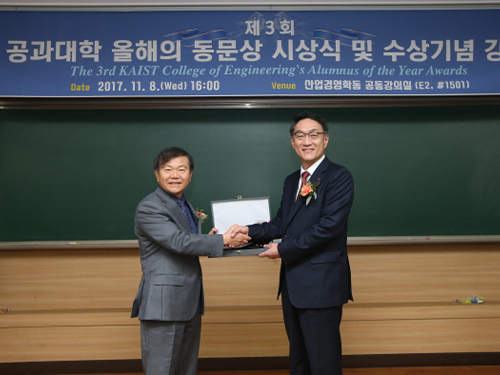 LG's Woo Jong Lee Named the Alumnus of College of Engineering
The College of Engineering at KAIST selected Woo Jong Lee, President and Head of the VC Business Division at LG Electronics Inc., as the 2017 Alumnus of the Year for the College of Engineering.
‘Alumnus of the Year’ is an award given to a distinguished alumnus who has contributed to the development of industrial technology or made outstanding academic achievements.
Lee graduated from KAIST with the master’s degrees in Industrial Engineering. He also worked at Daewoo Motors as an executive member in the development division. He has been a crucial human resource for LG since he joined the company in 2000.
While leading the VC business Division, which was established in 2013, Lee is recognized as a creative engineer as well as a leader in the automotive industry. Focusing on autonomous driving and eco-friendliness, he has been engaged in the production of major projects from the beginning to the end.
Since 2014, outstanding alumni whose achievements have represented KAIST at the highest level have received the award. The first recipient was Tae-Kyung Yoo, an executive at Lumens Co., Ltd., and the second recipient was Jung-Ju Kim, the founder of NXC. In 2016, the award was not given because an appropriate candidate could not be identified.
The award was held in the Industrial Engineering & Management Building (E2) on November 8. Faculty members including the dean of the College of Engineering Jong-Hwan Kim, the vice dean Hyochoong Bang, the head of Industrial & Systems Engineering Taesik Lee, and the dean of the KAIST Academy Tae-Eog Lee attended the ceremony.
After the ceremony, Lee delivered a lecture on ‘Auto-components Business of LG Electronics’ to KAIST students.
2017.11.09 View 5771
LG's Woo Jong Lee Named the Alumnus of College of Engineering
The College of Engineering at KAIST selected Woo Jong Lee, President and Head of the VC Business Division at LG Electronics Inc., as the 2017 Alumnus of the Year for the College of Engineering.
‘Alumnus of the Year’ is an award given to a distinguished alumnus who has contributed to the development of industrial technology or made outstanding academic achievements.
Lee graduated from KAIST with the master’s degrees in Industrial Engineering. He also worked at Daewoo Motors as an executive member in the development division. He has been a crucial human resource for LG since he joined the company in 2000.
While leading the VC business Division, which was established in 2013, Lee is recognized as a creative engineer as well as a leader in the automotive industry. Focusing on autonomous driving and eco-friendliness, he has been engaged in the production of major projects from the beginning to the end.
Since 2014, outstanding alumni whose achievements have represented KAIST at the highest level have received the award. The first recipient was Tae-Kyung Yoo, an executive at Lumens Co., Ltd., and the second recipient was Jung-Ju Kim, the founder of NXC. In 2016, the award was not given because an appropriate candidate could not be identified.
The award was held in the Industrial Engineering & Management Building (E2) on November 8. Faculty members including the dean of the College of Engineering Jong-Hwan Kim, the vice dean Hyochoong Bang, the head of Industrial & Systems Engineering Taesik Lee, and the dean of the KAIST Academy Tae-Eog Lee attended the ceremony.
After the ceremony, Lee delivered a lecture on ‘Auto-components Business of LG Electronics’ to KAIST students.
2017.11.09 View 5771 -
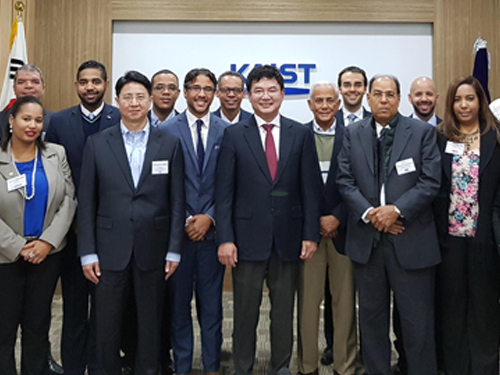 KAIST and KOICA Invited Dominican Republic Officials for Workshop
KAIST will host a two-week workshop for Dominican Republic officials and scholars in collaboration with KOICA (Korea International Cooperation Agency) beginning October 23 at KAIST.
The workshop aims to encourage academia-industry cooperation as one of the Projects for Human Resource Development for Science and Technology at KOICA. Dominican participants including the assistant minister of the Ministry of Higher Education, Science and Technology (MESCYT) and deans of engineering colleges at major universities will enjoy lectures from experts and visit enterprises known for excellent academia-industry collaboration.
According to the Center for Overseas Development, at which Professor WonJoon Kim in the School of Business and Technology Management at KAIST holds the position of director, the workshop is designed to develop human resources in the science and technology (S&T) area, share knowledge on research and development in the field of academia-industry cooperation, and help the participants acquire know-how for managing partnerships between related organizations and industries.
During the workshop, KAIST plans to transfer know-how and share knowledge on its academia-industry cooperation R&D system, in hopes that the workshop will help the Dominican Republic foster its manpower in higher education. The workshop organizers hope that the officers and scholars will be able to apply what they will learn for establishing and carrying out detailed action plans for academia-industry cooperation policies in an effective manner.
“This workshop provides an opportunity to learn about the development of S&T in Korea, academia-industry cooperation R&D, and fostering manpower in advanced S&T. Through the knowledge sharing, we can have a better understanding of academia-industry cooperation as well as education on advanced manpower,” said Pedro Antonio Eduardo, the assistant minister of MESCYT.
He added, “I hope that this workshop will further detailed cooperation between the two countries for Korean high-tech enterprises’ overseas expansion and advanced manpower education. The development model in Korea has many essential elements, so learning its engine for growth and polytechnic manpower education will help develop my country’s industry sector.”
The Project for Human Resource Development for Science and Technology is one of the official development assistance projects running from last year until 2019. It promotes R&D activities for S&T in the Dominican Republic, encouraging academia-industry cooperation by improving trainers in charge of advanced manpower education.
2017.10.30 View 5193
KAIST and KOICA Invited Dominican Republic Officials for Workshop
KAIST will host a two-week workshop for Dominican Republic officials and scholars in collaboration with KOICA (Korea International Cooperation Agency) beginning October 23 at KAIST.
The workshop aims to encourage academia-industry cooperation as one of the Projects for Human Resource Development for Science and Technology at KOICA. Dominican participants including the assistant minister of the Ministry of Higher Education, Science and Technology (MESCYT) and deans of engineering colleges at major universities will enjoy lectures from experts and visit enterprises known for excellent academia-industry collaboration.
According to the Center for Overseas Development, at which Professor WonJoon Kim in the School of Business and Technology Management at KAIST holds the position of director, the workshop is designed to develop human resources in the science and technology (S&T) area, share knowledge on research and development in the field of academia-industry cooperation, and help the participants acquire know-how for managing partnerships between related organizations and industries.
During the workshop, KAIST plans to transfer know-how and share knowledge on its academia-industry cooperation R&D system, in hopes that the workshop will help the Dominican Republic foster its manpower in higher education. The workshop organizers hope that the officers and scholars will be able to apply what they will learn for establishing and carrying out detailed action plans for academia-industry cooperation policies in an effective manner.
“This workshop provides an opportunity to learn about the development of S&T in Korea, academia-industry cooperation R&D, and fostering manpower in advanced S&T. Through the knowledge sharing, we can have a better understanding of academia-industry cooperation as well as education on advanced manpower,” said Pedro Antonio Eduardo, the assistant minister of MESCYT.
He added, “I hope that this workshop will further detailed cooperation between the two countries for Korean high-tech enterprises’ overseas expansion and advanced manpower education. The development model in Korea has many essential elements, so learning its engine for growth and polytechnic manpower education will help develop my country’s industry sector.”
The Project for Human Resource Development for Science and Technology is one of the official development assistance projects running from last year until 2019. It promotes R&D activities for S&T in the Dominican Republic, encouraging academia-industry cooperation by improving trainers in charge of advanced manpower education.
2017.10.30 View 5193 -
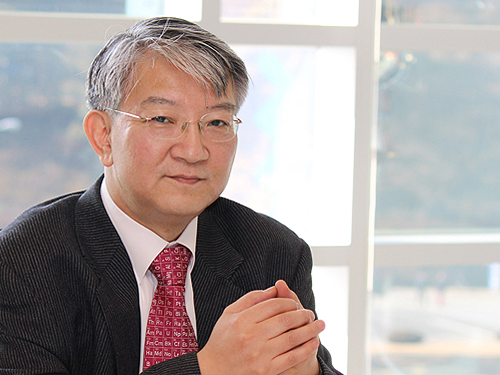 Distinguished Professor Lee Named International Fellow of the CAS
Distinguished Professor Sang Yup Lee from the Department of Chemical and Biomolecular Engineering at KAIST was awarded the title of distinguished professor and international fellow from the Chinese Academy of Sciences (CAS), and honorary professor from its affiliated organization the Tianjin Institute of Industrial Biotechnology (TIB).
The CAS recognized Distinguished Professor Lee for his significant contributions to biotechnology. He has made significant pioneering academic achievements in the area of systems metabolic engineering, which produces useful chemicals from microorganisms. Not only did he develop the first and best source technology in that field, but also came out with processes for the production of biofuel and environmentally-friendly chemicals.”
As a global leader in systems metabolic engineering, Distinguished Professor Lee has also been appointed as an honorary professor at Jiangnan University in Wuxi, China.
Distinguished Professor Lee was listed in the ‘Top 20 Translational Researchers of 2014’ selected by the renowned international journal Nature Biotechnology. Moreover, he was the first Asian recipient of the James E. Bailey Award in 2016 and Marvin J. Johnson Award in 2012, which are given to scholars in the field of biotechnology.
He is also one of 13 global scientists who are foreign members of the renowned academic societies the National Academy of Engineering and the National Academy of Sciences in the US. Furthermore, he received the ‘2017 Korea Best Scientist Award’ from the president of Korea in July. Finally, his founding field, systems metabolic engineering, was chosen as one of the ‘Top 10 Emerging Technologies of 2016’ by the World Economic Forum.
The Chinese Academy of Sciences, established in November 1949, is an academic organization that carries out research on basic sciences and natural sciences in China. It defined its science and technology system to include the fields of basic sciences, natural sciences, and high technology. While having a base in Beijing, its branch academies are located in 12 main cities along with 117 affiliates and 100 national key labs.
2017.10.26 View 7445
Distinguished Professor Lee Named International Fellow of the CAS
Distinguished Professor Sang Yup Lee from the Department of Chemical and Biomolecular Engineering at KAIST was awarded the title of distinguished professor and international fellow from the Chinese Academy of Sciences (CAS), and honorary professor from its affiliated organization the Tianjin Institute of Industrial Biotechnology (TIB).
The CAS recognized Distinguished Professor Lee for his significant contributions to biotechnology. He has made significant pioneering academic achievements in the area of systems metabolic engineering, which produces useful chemicals from microorganisms. Not only did he develop the first and best source technology in that field, but also came out with processes for the production of biofuel and environmentally-friendly chemicals.”
As a global leader in systems metabolic engineering, Distinguished Professor Lee has also been appointed as an honorary professor at Jiangnan University in Wuxi, China.
Distinguished Professor Lee was listed in the ‘Top 20 Translational Researchers of 2014’ selected by the renowned international journal Nature Biotechnology. Moreover, he was the first Asian recipient of the James E. Bailey Award in 2016 and Marvin J. Johnson Award in 2012, which are given to scholars in the field of biotechnology.
He is also one of 13 global scientists who are foreign members of the renowned academic societies the National Academy of Engineering and the National Academy of Sciences in the US. Furthermore, he received the ‘2017 Korea Best Scientist Award’ from the president of Korea in July. Finally, his founding field, systems metabolic engineering, was chosen as one of the ‘Top 10 Emerging Technologies of 2016’ by the World Economic Forum.
The Chinese Academy of Sciences, established in November 1949, is an academic organization that carries out research on basic sciences and natural sciences in China. It defined its science and technology system to include the fields of basic sciences, natural sciences, and high technology. While having a base in Beijing, its branch academies are located in 12 main cities along with 117 affiliates and 100 national key labs.
2017.10.26 View 7445 -
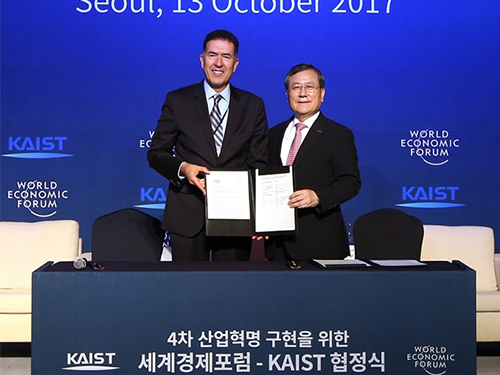 KAIST Partners with WEF to Prepare for the 4th Industrial Revolution
KAIST President Sung-Chul Shin and the Head of the World Economic Forum Center for the Fourth Industrial Revolution, Murat Sonmez, made a commitment to build cooperation in an active manner for addressing the ramifications of the Fourth Industrial Revolution.
The two signed an MOU to cooperate in research in related fields on October 13 after holding a roundtable discussion titled “The Future of Jobs and Inclusive Growth in Korea”. It is the first partnership that the WEF has sealed with an academic institution.The roundtable discussion brought together distinguished guests from politics, non-profit civic organizations, academia, and enterprises including Daejeon Mayor Seon-Taek Kwon, Doosan Group Vice Chairman Lee Hyun-Soon, and Korean Venture Business Association President Ahn Keon-Joon.
During the news conference, President Shin said, “This event means a lot because it explores ways in which inclusive growth and job creation can be realized in Korea. To move forward in the new age of the Fourth Industrial Revolution, every country needs to adopt appropriate new policies suitable for their specific market environments. KAIST will contribute to this process for Korea as well as for the global community.”
President Shin also said, “Korea has been a fast follower in previous industrial revolutions. Now, we have the momentum to seize the opportunities in the wake of this revolution. KAIST is dedicated to leading Korea into becoming a first mover in the Fourth Industrial Revolution by cooperating with the WEF.”
“Two decades later, we will live with considerable number of robots around us. It is possible that our societies in the future will consist of Homo sapiens and Robo sapiens. We need to create new jobs for Homo sapiens to prepare for a society that we will have to coexist with a new industrial tribe. Industries need continuing education to retrain workers for the ever evolving industrial landscape of the future,” President Shin emphasized.
Meanwhile, Sonmez pointed out that all stakeholders should participate in understanding the new industrial environment’s ramifications, saying “Societies, governments, public and private sectors, startups, and academia should co-design inclusive models through global efforts. Ethics and influences on the job market should also be taken into consideration.”
Sonmez said nine factors such as blockchains, internet of things, artificial intelligence, machine learning, cross-border data blow, drones, 3D printing, autonomous driving, the environment, and precision medicine will take center stage in the Fourth Industrial Revolution, In particular, he said that blockchains, which are a cybersecurity technology for online financial transactions, will bring even bigger changes than the ‘World Wide Web’ has done over the past three decades.
“To this end, we will have to work closely with major academic institutes. Through this partnership with KAIST, we will make the fruits of the new industrial environment benefit Koreans and Korean society,” Sonmez added.
2017.10.14 View 5902
KAIST Partners with WEF to Prepare for the 4th Industrial Revolution
KAIST President Sung-Chul Shin and the Head of the World Economic Forum Center for the Fourth Industrial Revolution, Murat Sonmez, made a commitment to build cooperation in an active manner for addressing the ramifications of the Fourth Industrial Revolution.
The two signed an MOU to cooperate in research in related fields on October 13 after holding a roundtable discussion titled “The Future of Jobs and Inclusive Growth in Korea”. It is the first partnership that the WEF has sealed with an academic institution.The roundtable discussion brought together distinguished guests from politics, non-profit civic organizations, academia, and enterprises including Daejeon Mayor Seon-Taek Kwon, Doosan Group Vice Chairman Lee Hyun-Soon, and Korean Venture Business Association President Ahn Keon-Joon.
During the news conference, President Shin said, “This event means a lot because it explores ways in which inclusive growth and job creation can be realized in Korea. To move forward in the new age of the Fourth Industrial Revolution, every country needs to adopt appropriate new policies suitable for their specific market environments. KAIST will contribute to this process for Korea as well as for the global community.”
President Shin also said, “Korea has been a fast follower in previous industrial revolutions. Now, we have the momentum to seize the opportunities in the wake of this revolution. KAIST is dedicated to leading Korea into becoming a first mover in the Fourth Industrial Revolution by cooperating with the WEF.”
“Two decades later, we will live with considerable number of robots around us. It is possible that our societies in the future will consist of Homo sapiens and Robo sapiens. We need to create new jobs for Homo sapiens to prepare for a society that we will have to coexist with a new industrial tribe. Industries need continuing education to retrain workers for the ever evolving industrial landscape of the future,” President Shin emphasized.
Meanwhile, Sonmez pointed out that all stakeholders should participate in understanding the new industrial environment’s ramifications, saying “Societies, governments, public and private sectors, startups, and academia should co-design inclusive models through global efforts. Ethics and influences on the job market should also be taken into consideration.”
Sonmez said nine factors such as blockchains, internet of things, artificial intelligence, machine learning, cross-border data blow, drones, 3D printing, autonomous driving, the environment, and precision medicine will take center stage in the Fourth Industrial Revolution, In particular, he said that blockchains, which are a cybersecurity technology for online financial transactions, will bring even bigger changes than the ‘World Wide Web’ has done over the past three decades.
“To this end, we will have to work closely with major academic institutes. Through this partnership with KAIST, we will make the fruits of the new industrial environment benefit Koreans and Korean society,” Sonmez added.
2017.10.14 View 5902 -
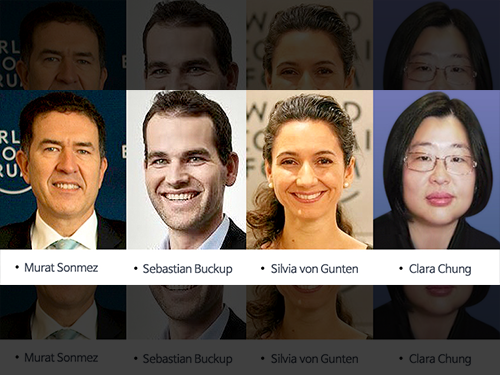 KAIST-WEF Roundtable on Inclusive Growth and Job Creation
The World Economic Forum (WEF) will join KAIST in an effort to address sweeping global problems in the wake of the Fourth Industrial Revolution. The two will co-host a roundtable on ‘Shaping Korea’s Priorities for Inclusive Growth and Job Creation in the Fourth Industrial Revolution’ on October 13 at Lotte Hotel in Seoul.
The roundtable will bring together leaders from government, industry, universities, and non-profit civic organizations to have an in-depth discussion on a thought-provoking agenda of inclusive growth and job creation which scientific and technological changes will bring about. The event will provide a platform to explore practical collaboration and innovative strategies for better job creation and innovation ecosystems.
The two will also sign an MOU for collaboration between the Fourth Industrial Revolution Information Center (FIRIC) of KAIST and the WEF Center for the Fourth Industrial Revolution (C4IR).
President Sung-Chul Shin of KAIST and the Head of the WEF Center for the Fourth Industrial Revolution, Murat Sonmez, will lead the panel discussion titled ‘Inclusive Growth and the Fourth Industrial Revolution’ which will be attended by leaders from government, industry, and non-profit civic organizations.
At the breakout sessions, the topics will be “Future Jobs” and the “Creation of Innovation Ecosystems”. Additionally, a discussion on the “SME 4.0 Initiative”, which is a program pushed forward by KAIST in collaboration with local governments, will talk about job creation through innovation in small and medium-sized enterprises (SMEs). The WEF will introduce their two-year activities and research on the Fourth Industrial Revolution, which have great potential and a high possibility of successfully undergoing the revolution, to Korea.
Since WEF Executive Chairman Klaus Schwab brought up the topic of the Fourth Industrial Revolution, the WEF has been leading agenda topics and discussions on high-profile matters, including ‘technology-driven but human-centered inclusive growth’ in predicting the future of jobs.
The WEF is a nonprofit organization committed to addressing the world’s weightiest problems. It is best known for its annual meetings in Davos, Switzerland, which attracts leaders from around the world. KAIST has been participating in this summit since 2009. President Shin will also attend the upcoming Davos summit next January. Distinguished Professor Sang Yup Lee who heads the KAIST Institute and the FIRIC is the co-chair of the Global Council on Biotechnology and a member of the Global Future Council on the Fourth Industrial Revolution at the WEF.
Moreover, President Shin and Mr. Sonmez will explain the background of the roundtable and share the results of the sessions at a joint news conference.
2017.09.28 View 7392
KAIST-WEF Roundtable on Inclusive Growth and Job Creation
The World Economic Forum (WEF) will join KAIST in an effort to address sweeping global problems in the wake of the Fourth Industrial Revolution. The two will co-host a roundtable on ‘Shaping Korea’s Priorities for Inclusive Growth and Job Creation in the Fourth Industrial Revolution’ on October 13 at Lotte Hotel in Seoul.
The roundtable will bring together leaders from government, industry, universities, and non-profit civic organizations to have an in-depth discussion on a thought-provoking agenda of inclusive growth and job creation which scientific and technological changes will bring about. The event will provide a platform to explore practical collaboration and innovative strategies for better job creation and innovation ecosystems.
The two will also sign an MOU for collaboration between the Fourth Industrial Revolution Information Center (FIRIC) of KAIST and the WEF Center for the Fourth Industrial Revolution (C4IR).
President Sung-Chul Shin of KAIST and the Head of the WEF Center for the Fourth Industrial Revolution, Murat Sonmez, will lead the panel discussion titled ‘Inclusive Growth and the Fourth Industrial Revolution’ which will be attended by leaders from government, industry, and non-profit civic organizations.
At the breakout sessions, the topics will be “Future Jobs” and the “Creation of Innovation Ecosystems”. Additionally, a discussion on the “SME 4.0 Initiative”, which is a program pushed forward by KAIST in collaboration with local governments, will talk about job creation through innovation in small and medium-sized enterprises (SMEs). The WEF will introduce their two-year activities and research on the Fourth Industrial Revolution, which have great potential and a high possibility of successfully undergoing the revolution, to Korea.
Since WEF Executive Chairman Klaus Schwab brought up the topic of the Fourth Industrial Revolution, the WEF has been leading agenda topics and discussions on high-profile matters, including ‘technology-driven but human-centered inclusive growth’ in predicting the future of jobs.
The WEF is a nonprofit organization committed to addressing the world’s weightiest problems. It is best known for its annual meetings in Davos, Switzerland, which attracts leaders from around the world. KAIST has been participating in this summit since 2009. President Shin will also attend the upcoming Davos summit next January. Distinguished Professor Sang Yup Lee who heads the KAIST Institute and the FIRIC is the co-chair of the Global Council on Biotechnology and a member of the Global Future Council on the Fourth Industrial Revolution at the WEF.
Moreover, President Shin and Mr. Sonmez will explain the background of the roundtable and share the results of the sessions at a joint news conference.
2017.09.28 View 7392